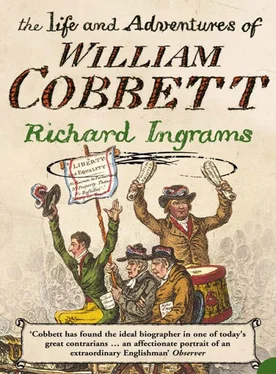But other important issues played their part in the process. In 1802, the year of the founding of the Political Register , Cobbett was beginning to realise that his knowledge of economics was minimal. ‘I knew nothing of this matter in 1802,’ he wrote. ‘I did not know what had made the Bank of England. I did not know what the slang terms of consols meant. I did not know what Dividend, omnium scrip, or any of the rest of it imported.’ Most of us are quite happy to go through life with only a shaky grasp of economics, but Cobbett was not like that. He had to find out for himself. He read Adam Smith – ‘I could make neither top nor tail of the thing.’ He read the Acts of Parliament setting up the Bank of England, which he says gave him some sort of insight ‘with regard to the accursed thing called the National Debt’. But it was not until he read Thomas Paine’s pamphlet ‘Decline and Fall of the English System of Finance’ (1796) that the scales fell from his eyes.
Leaving economics aside for the moment, Cobbett’s discovery of Paine as a purveyor of truth did perhaps have something of the road to Damascus about it, in that until this date he had persecuted Paine, just as St Paul had persecuted the followers of Jesus. Paine’s involvement with the rebels in the American War of Independence and later with the French Revolutionaries – in both cases against the British interest – and above all his denial of the divinity of Christ in his book The Age of Reason had turned him, in the eyes of the establishment, into a Guy Fawkes figure, responsible for all the unrest and the Jacobinism, all the subversive ideas that seemed to threaten the peace and tranquillity of good Englishmen.
During his Porcupine years in America Cobbett had joined in the hate campaign as wholeheartedly as anyone. His pamphlet ‘The Life of Thomas Paine’ (1796) is as vituperative as anything he ever wrote: ‘The scoundrel of a staymaker … the hoary blasphemer … he has done all the mischief he can in the world and … whenever or wherever he breathes his last, he will excite neither sorrow nor compassion.’ Cobbett again abused him in his paper the Political Censor , calling him an ‘atrocious infamous miscreant’ and many things besides. (George Washington approved, though making ‘allowances for the asperity of an Englishman for some of his strong and coarse expressions’. 9 ) Yet it was now this very same blasphemer and miscreant who had managed to open Cobbett’s eyes to the nature of the economic system. Had he been wrong about Paine? And was it possible that all those politicians and writers who had portrayed Paine as the devil incarnate were equally mistaken?
In 1796 Paine had written a famous letter to Washington, whose victory over the British he had helped so much to secure, attacking the President for failing to come to his aid when he was in prison in Paris facing execution. The letter is an eloquent testimony to the general ingratitude of politicians, once they achieved power, to those who have helped them along the way. Cobbett himself was beginning to experience the same reaction. He might have thought, after the assistance he had given the government by writing, for free, ‘Important Considerations’ at the time invasion threatened, that he and his Political Register would be helped in return. On the contrary, in 1804 he found himself once again facing a libel charge.
As usual, England’s difficulty was Ireland’s opportunity. In 1803 the Irish republicans, on this occasion led by Robert Emmet, mounted a rebellion, killing the Lord Chief Justice and several English soldiers. In the Political Register Cobbett attacked the Addington government for its lack of foresight, stating that Ireland was ‘in a state of total neglect and abandonment’. 10 The article was followed by three anonymous letters from Ireland signed ‘Juverna’. With a stylish and satirical pen ‘Juverna’ accused the English authorities, and in particular the Lord Lieutenant, Lord Hardwicke, of failing to do anything to prevent the uprising although they had advance information that it was going to take place. Hardwicke, it was claimed, had even returned to his official residence in Phoenix Park in order not to be in any personal danger, and had subsequently done everything possible to blame the military commander, General Fox, for what had happened. Obviously well informed, ‘Juverna’ peppered his account of the incident with a number of satirical asides on the British politicians involved, suggesting, for example, that Hardwicke was typical of ‘that tribe who have been sent over to us to be trained up here into politicians as they train the surgeons’ apprentices in the hospitals by setting them at first to bleed the pauper patients’. He was, the author continued, ‘in rank an earl, in manners a gentleman, in morals a good father and a good husband … celebrated for understanding the modern method of fattening sheep as well as any man in Cambridgeshire’.
The offence of criminal (or seditious) libel with which Cobbett was now charged had been a convenient weapon in the hands of successive governments since the sixteenth century, when according to a modern commentator ‘the Star Chamber regarded with the deepest suspicion the printed word in general, and anything which looked like criticism of the established institutions of Church and State in particular’. 11 John Wilkes, the great champion of press freedom, had been prosecuted for criminal libel, and throughout the first decades of the nineteenth century the charge was regularly used to silence persistent critics of the government, when necessary by putting them in prison.
In Cobbett’s trial the thrust of the attack by the prosecuting attorney Spencer Perceval (later the Prime Minister) was to humiliate Cobbett in the eyes of the court by emphasising his lowly social origins. ‘Who is Mr Cobbett?’ Perceval asked contemptuously. ‘Is he a man of family in this country? Is he a man writing purely from motives of patriotism? Quis homo hic est? Quo patre natus? ’ (Who is this man? Who was his father?) The Latin tags would have been chosen deliberately by the lawyer in the knowledge that Cobbett would not understand them. Such an attitude, in an age when the government consisted almost entirely of members of the aristocracy educated in the classics at the best public schools, would not have struck the jury as unjust. But it was typical of the snobbery that Cobbett was to face throughout his career. Snobbery aside, Perceval went on to suggest (with the judge’s obvious approval) that it was not permitted, by law, to ridicule the government and its ministers in the way ‘Juverna’ and the Political Register had done. An indication of the lengths to which the law officers were prepared to go in arguing this case is the way Perceval even introduced the fact that Cobbett’s paper had referred to the Prime Minister as ‘the Doctor’. In fact Addington was generally known to all his colleagues by this nickname, the origin of which was that his father had been a doctor:
I do not mean to say that the describing such a man as Mr Addington, by the epithet of Doctor Addington, is degrading to him, nor that I would advise that such an epithet should become the subject of a prosecution in a Court of Justice: but, surely no one who has the least liberality of feeling, or the least sense of decency, could think it becoming to taunt such a gentleman as Mr Addington: a gentleman who, the more he is known, the more his character will be admired. For my part, I feel no sympathy with those who think there is any wit in such titles. Mr Addington is the son of a man who most ably and skilfully practised in a liberal profession, who by his talents became justly eminent in that profession, and whose son raised himself, by his great abilities, to one of the highest offices in this country. I again say, that for any publication calling Mr Addington ‘Doctor Addington’, or for any flippancy of that nature, standing by itself, I should think it beneath the dignity of the Right honourable gentleman to make it the subject of a prosecution; but I also say, that when you see an epithet of this nature introduced, it does show the spirits with which the libel was published and that it was a systematic attack upon the whole government of Ireland, by bringing into contempt and ridicule the persons placed by his Majesty at the head of the Government. 12
Читать дальше











